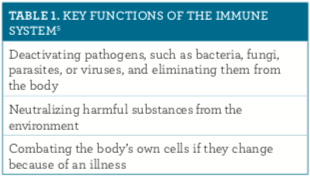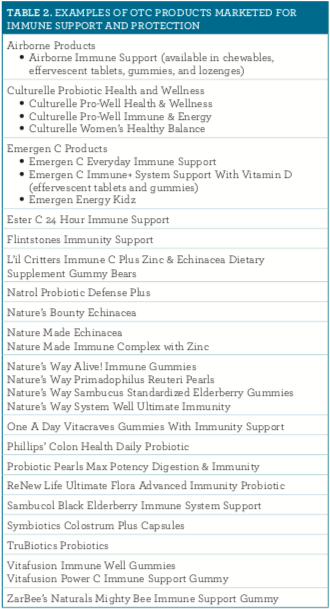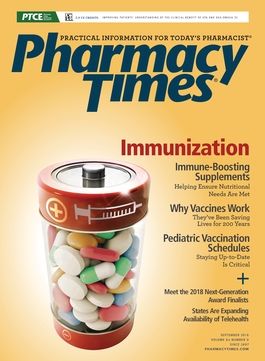Publication
Article
Pharmacy Times
Recharging the Immune System With Supplements
Author(s):
The immune system is essential for our survival and has several critical functions that protect the human body, It guards against damage, disease, and infectious organisms, including bacteria, fungi, parasites, and viruses in the environment.
The immune system is essential for our survival and has several critical functions that protect the human body. It guards against damage, disease, and infectious organisms, including bacteria, fungi, parasites, and viruses in the environment.1-4 It can also recognize and destroy abnormal cells that originate from host tissues.1,4 The immune system can be broadly divided into 3 general functional divisions: the acquired (also called adaptive or specific) immune system, the innate or natural immune system, and the passive or borrowed immune system, which includes a newborn’s receiving antibodies from the mother through the placenta before birth and in breast milk after birth.1,2
The immune system functions by using an exclusion barrier: eliminating pathogens and tolerating nonthreatening sources of antigens, and maintaining a memory of immunological encounters (Table 1).5 Pharmacists are likely to encounter patients who need guidance on using nutritional supplements marketed to boost the immune system, particularly right before or during cold and influenza season. Pharmacists are in a pivotal position to educate patients about the proper use of these supplements. They can also be instrumental in determining whether nutritional supplements are appropriate and directing those with medical conditions to confer with their primary care providers when warranted.
FACTORS THAT MAY IMPAIR THE IMMUNE SYSTEM
Investigators have discovered that certain factors may influence the immune system, including medical conditions, chronic stress, and lack of sleep, as well as pharmacological agents like corticosteroids, tumor necrosis factor inhibitors, and immunosuppressants used to treat autoimmune disorders, immune-mediated disease, and conditions in transplant patients.6-9Chronic insomnia is connected with not only an increase in inflammatory markers but also immunodeficiency.9 Moreover, research results have shown that the immune system can be affected by the aging process and that there appears to be an association between immunity and nutrition in elderly patients, who tend to eat less, may have less variety in their diets, and experience loss of appetite caused by some medications and medical conditions.10

Some research has demonstrated that undernourishment and nutritional deficiencies of zinc, selenium, iron, copper, folic acid, and vitamins A, B6, C, and E have noteworthy influences on immune system responses.11 Being overweight or obese may also weaken the response.11 Investigators are continually exploring the effects of age, diet, exercise, psychological stress, and other factors on the immune response in animals and humans.12
Eating a balanced and healthy diet is critical, and the recommended essential nutrients that support immune health include vitamins A, C, B6, and E, as well as folate, selenium, iron, and zinc, according to the Academy of Nutrition and Dietetics.13 The use of prebiotics and probiotics may also influence the immune system’s response.13
RECENT NEWS
According to new research, aging vessels connecting the brain and the immune system play critical roles in both Alzheimer disease and the decline in cognitive ability.14 Results of another study showed exciting information on the role of immunoglobulin A in pro- moting immune health and regulating the composition and function of gut microbiota.15
NUTRITIONAL SUPPLEMENTS
Immune-boosting supplements may contain one or more of the vitamins A, B, C, D, and E, along with trace elements of zinc and selenium (table 2). Some also contain Echinacea, ginger, and other herbal ingredients for immune enhancement. Other products marketed for immune support include prebiotics and probiotics. Some contain colostrum, which is rich in antibodies and immunoglobulins A and E that may provide immune-modulating benefits.16 Many other products marketed for strengthening the immune system may contain Echinacea, elderberry, and traces of zinc.16

CONCLUSION
A healthy diet is the best way to maintain a strong immune system. But nutritional supplements are a convenient and easy way to ensure that nutritional needs are met. Before recommending any supplements, pharmacists should screen for possible contraindications and drug-nutrient interactions. Patients who have medical conditions or take other medications should be encouraged to discuss these supplements with their primary care providers before using them. Additionally, patients should be prompted to always adhere to recommended doses and to use products only as directed. Patients should also be cautioned about taking megadoses of vitamins and to read labels to check for therapeutic duplications. During counseling, pharmacists can also remind patients about obtaining annual flu vaccines as well as maintaining immunization schedules for other recommended vaccines.
Yvette C. Terrie, BSPharm, RPh, is a consulting pharmacist and a medical writer in Haymarket, Virginia.
References
- Calder PC. Feeding the immune system. Proc Nutr Soc. 2013;72(suppl 3):299-309. doi: 10.1017/S0029665113001286.
- Newman T. How the immune system works. MedNews Today. medicalnewstoday. com/articles/320101.php. Updated January 11, 2018. Accessed July 25, 2018
- Hendry C, Farley A, McLafferty E, Johnstone C. Function of the immune system. Nurs Stand. 2013;27(suppl 19):35-42. doi: 10.7748/ns2013.01.27.19.35.c9497.
- Delves PJ. Overview of the immune system. Merck Manual Professional Version website. merckmanuals.com/professional/immunology-allergic-disorders/biolo- gy-of-the-immune-system/overview-of-the-immune-system. Updated January 2017. Accessed July 25, 2018.
- How does the immune system work? PubMed Health website. ncbi.nlm.nih.gov/ pubmedhealth/PMH0072548. Updated September 21, 2016. Accessed July 25, 2018.
- Michigan State University. What does and doesn’t affect immune system. ScienceDaily. sciencedaily.com/releases/2008/02/080204172208.htm. Published February 8, 2008. Accessed July 30, 2018.
- Medications that weaken your immune system and fungal infections. CDC website. cdc. gov/fungal/infections/immune-system.html. Updated January 25, 2017. Accessed July 25, 2018.
- Wiseman AC. Immunosuppressive medications. Clin J Am Soc Nephrol. 2016;11(suppl 2):332-343. doi: 10.2215/CJN.08570814.
- Besedovsky L, Lange T, Born J. Sleep and immune function. Pflugers Archiv. 2012;463(1):121-137. doi: 10.1007/s00424-011-1044-0.
- Cannizzo ES, Clement CC, Morozova K, et al. Age-related oxidative stress compromises endosomal proteostasis. Cell Rep. 2012;2(suppl 1):136-149. doi: 10.1016/j.celrep.2012.06.005.
- Chandra RK. Nutrition and the immune system: an introduction. Am J Clin Nutr. 1997;66(suppl 2):460S-463S.doi: 10.1093/ajcn/66.2.460S.
- Harvard Medical School. How to boost your immune system. Harvard Health Publishing website. health.harvard.edu/staying-healthy/how-to-boost-your-immune- system. Updated July 16, 2018. Accessed July 25, 2018.
- Academy of Nutrition and Dietetics. Protecting your health with immune boost- ing nutrition. Eat Right website. eatright.org/resource/health/wellness/preventing- illness/protect-your-health-with-immune-boosting-nutrition. Published May 31, 2017. Accessed July 26, 2018.
- Da Mesquita S, Louveau A, Vaccari A, et al. Functional aspects of meningeal lymphatics in aging and Alzheimer’s disease. Nature. 2018;560(7717):185-191. doi: 10.1038/s41586-018-0368-8.
- Nakajima A, Vogelzang A, Maruya M, et al. IgA regulates the composition and metabolic function of gut microbiota by promoting symbiosis between bacteria. J Exp Med. 2018;215(8):2019-2034. doi: 10.1084/jem.20180427.
- McQueen CE, Orr KK. Natural products. In: Krinsky DL, Ferreri SP, et al, eds. Handbook of Nonprescription Drugs: An Interactive Approach to Self- Care. 19th ed. Washington, DC: American Pharmacists Association; 2018. =org/10.21019/9781582122656.ch51

Newsletter
Stay informed on drug updates, treatment guidelines, and pharmacy practice trends—subscribe to Pharmacy Times for weekly clinical insights.






